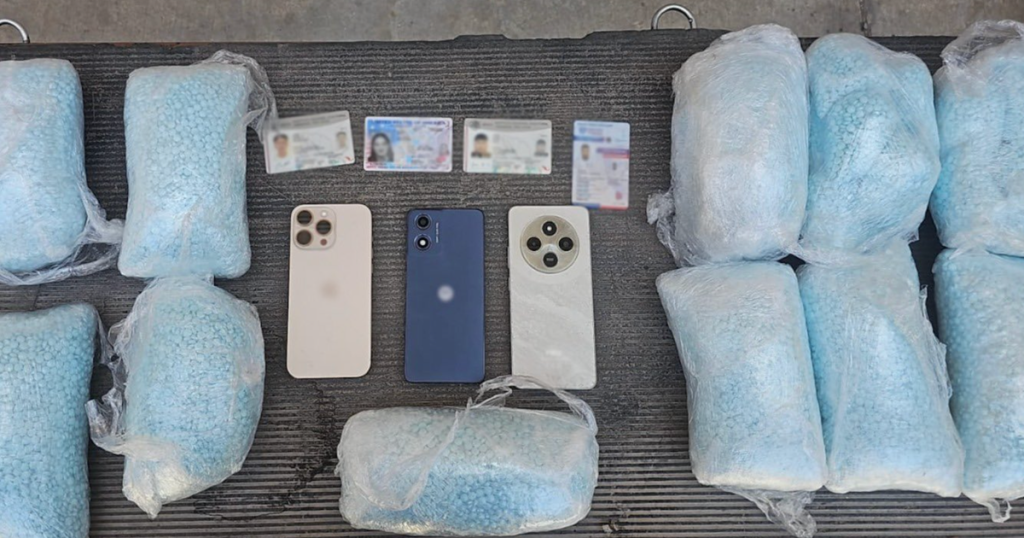In a significant operation against drug trafficking, Mexican authorities have arrested three individuals linked to the fentanyl crisis, including an American citizen and a dual national. The operation, which took place in Ciudad Juárez, resulted in the seizure of approximately 110,000 fentanyl pills. This development highlights the ongoing collaboration between U.S. and Mexican authorities to combat drug-related crime and illicit substance distribution.
| Article Subheadings |
|---|
| 1) Overview of the Operations |
| 2) Details of the Arrests |
| 3) Impact on Drug Trafficking |
| 4) Ongoing Efforts Against Fentanyl Distribution |
| 5) Government Response and Future Actions |
Overview of the Operations
The recent operation, led by the Secretariat of Security and Citizen Protection (SSCP) in Mexico, involved collaboration with multiple federal agencies, including the Federal Bureau of Investigation (FBI). This integration of resources and intelligence played a crucial role in successfully executing the arrests in Ciudad Juárez, a city that has been significantly affected by the opioid crisis.
The Mexican authorities revealed that a series of intelligence work and surveillance actions, aided by data shared with the U.S., led them to the suspects. This operation underscores the importance of international cooperation in addressing the complexities of drug trafficking, particularly with substances like fentanyl that have severe social implications. The operation reflects a broader strategy to dismantle organized crime networks that facilitate drug distribution across borders.
Details of the Arrests
The SSCP reported that the arrests occurred after security agents noticed a suspicious vehicle during ground patrols in Ciudad Juárez. Upon identifying two men and a woman inside the vehicle, the suspects attempted to flee the scene. Authorities initiated a brief pursuit, which concluded when the vehicle was stopped.
Upon searching the vehicle, agents uncovered the seized fentanyl pills, packaged in ten separate transparent plastic bags. Along with the drugs, authorities also confiscated four IDs and three cell phones, which could provide further evidence or information regarding the suspects’ activities. The identities of the suspects have not been disclosed; however, it has been confirmed that one individual is an American, while one of the males holds dual nationality in the United States and Mexico and has a standing warrant in the U.S. for drug-related offenses.
Impact on Drug Trafficking
The SSCP emphasized that these arrests mark a significant step in the ongoing effort to curb the trafficking of illicit substances, particularly to protect vulnerable populations, such as young people. The sheer volume of fentanyl pills captured suggests a substantial attempt to infiltrate markets, amplifying concerns about the drug’s availability and the potential for increased overdose incidents.
Fentanyl and similar synthetic opioids have been a major focus for both U.S. and Mexican officials due to their lethality and the increasing rates of addiction and overdose deaths attributed to these substances. By intercepting large quantities before they reach consumers, authorities aim to diminish the tragic consequences associated with fentanyl abuse.
Ongoing Efforts Against Fentanyl Distribution
The recent arrests are part of a larger strategy by the Mexican government, under President Claudia Sheinbaum, to combat illegal drug distribution and ensure public safety. Her administration has prioritized stopping the flow of fentanyl and other highly addictive substances, which have escalated public health crises in both the U.S. and Mexico.
In past months, Mexican authorities announced several major seizures of fentanyl, including one that was termed the largest in the country’s history in early 2024. These seizures reflect a concerted effort to dismantle distribution networks while putting pressure on both domestic and international elements involved in drug trafficking. The government has pledged to continue such operations, marking a steadfast commitment to addressing the fentanyl epidemic.
Government Response and Future Actions
Following the latest arrests, the SSCP stated that these operations contribute to an affirmative stance against drug trafficking, setting a precedent for stricter enforcement of laws against the distribution of illicit substances. Furthermore, these developments prompt ongoing discussions regarding the moral and ethical implications of drug policy in both countries.
Going forward, experts suggest the need for a dual approach that incorporates enforcement with education and rehabilitation efforts that target high-risk groups. As drug cartels continue to adapt to the changing landscape of law enforcement and regulation, authorities must remain vigilant and responsive to emerging challenges in drug abuse prevention and treatment strategies.
| No. | Key Points |
|---|---|
| 1 | Three individuals, including an American citizen, were arrested in Ciudad Juárez. |
| 2 | The operation resulted in the seizure of 110,000 fentanyl pills. |
| 3 | The arrests were made through a collaboration between the SSCP, FBI, and various federal agencies. |
| 4 | Fentanyl’s role in the ongoing drug crisis continues to be a priority for the Mexican government. |
| 5 | Future efforts will likely involve a blend of enforcement and harm reduction strategies. |
Summary
The recent arrests in Mexico highlight the ongoing battle against fentanyl trafficking and the collaboration between the U.S. and Mexican authorities to confront shared challenges. The significant amount of fentanyl seized during this operation poses serious implications for public health and safety. Continuous efforts and strategic initiatives support a proactive approach to combating drug trafficking and mitigating the effects of opioid addiction within communities. This incident reflects a crucial step in prioritizing the health and well-being of the public in both nations.
Frequently Asked Questions
Question: What are the implications of the fentanyl crisis in the U.S. and Mexico?
The fentanyl crisis leads to rising addiction rates and a concerning increase in overdose deaths, prompting urgent responses from both governments to curb drug distribution.
Question: How does international cooperation affect drug enforcement efforts?
International cooperation enables authorities to share intelligence and resources, making it more effective to target drug trafficking networks that span across borders.
Question: What steps are being taken to educate the public about the dangers of fentanyl?
Public health initiatives focus on education about the dangers of fentanyl, promoting awareness, and providing resources for addiction prevention and treatment.


